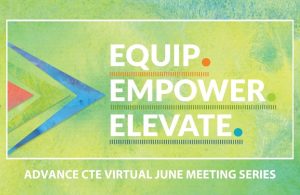 On June 15, Advance CTE held the second of three events in our Virtual June Meeting Series. The series offers three opportunities to equip Career Technical Education (CTE) leaders with the latest research and innovations, empower them to succeed, and elevate their work to raise awareness of the value of CTE.
On June 15, Advance CTE held the second of three events in our Virtual June Meeting Series. The series offers three opportunities to equip Career Technical Education (CTE) leaders with the latest research and innovations, empower them to succeed, and elevate their work to raise awareness of the value of CTE.
The week’s sessions centered around the theme EMPOWER: Strengthening Our Capacity to Realize CTE Without Limits. Attendees delved into processes to build better state systems with a keynote presentation from Rhode Island Department of Education Chief Innovation Officer Spencer Sherman, followed by content-rich breakouts and discussions to build connections and knowledge. Each breakout session was aligned to one of the five foundational commitments of CTE Without Limits: A Shared Vision for the Future of Career Technical Education.
Keep reading for top quotes and resources from the day!
Keynote: Innovating by Working Together: Strategic Impact through Systems Alignment
“When a student graduates high school, the trail shouldn’t end. Right now you have to cut down trees and jump over a rock to get to the next trail [to college and career]. We need to [design systems] so that students don’t get lost along the way.” – Spencer Sherman
The keynote opened with a welcome message from Rhode Island Commissioner of Elementary and Secondary Education Angelica Infante-Green, who shared her personal story and commitment to serving learners of all abilities and how the nation’s smallest state is expanding access to CTE for differently-abled learners.
Rhode Island’s Chief Innovation Officer, Spencer Sherman, then shared a deep dive on the state’s approach to systems alignment through the PrepareRI initiative and how it improved outcomes for learners including a tripled increase in the number of graduates with college credit or industry-recognized credentials. Sherman shared organization models that acknowledge the current top-down approach of many states while also illustrating how collaboration and communication can be created across both systems and leadership levels.
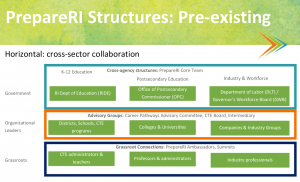 Sherman emphasized the importance of engaging middle-level managers and staff and designing processes for community organizations to align initiatives with one other in addition to engaging with government. Throughout the presentation, he reminded attendees that these improvements should be designed to last beyond any one person. He also centered these improvements around the pursuit of improving learner outcomes and creating seamless transitions to postsecondary and career paths, as illustrated in the quote above. Additional resources on Rhode Island’s governing structures can be found in Advance CTE’s Learning that Works Resource Center.
Sherman emphasized the importance of engaging middle-level managers and staff and designing processes for community organizations to align initiatives with one other in addition to engaging with government. Throughout the presentation, he reminded attendees that these improvements should be designed to last beyond any one person. He also centered these improvements around the pursuit of improving learner outcomes and creating seamless transitions to postsecondary and career paths, as illustrated in the quote above. Additional resources on Rhode Island’s governing structures can be found in Advance CTE’s Learning that Works Resource Center.
Data Breakout: Building a Culture of Data
Two states participating in the Postsecondary Data Initiative led by Advance CTE and ECMC Foundation were highlighted in a breakout focused on how to leverage human and infrastructure capital to create data-informed and data-driven systems.
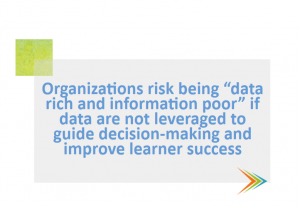 Peter Plourde, Associate Professor and Director of Faculty Development for the Office of Academic Affairs at the University of the District Columbia Community College and Kelly Zinck, Education Team Research Analyst, Oregon Higher Education Coordinating Commission emphasized the importance of creating a welcoming environment where state CTE staff can get comfortable understanding small amounts of data and building up, as well as feel comfortable asking questions to build knowledge. Attendees were provided three strategies of “Identify,” “Educate” and “Build Trust” to open the black box of data.
Peter Plourde, Associate Professor and Director of Faculty Development for the Office of Academic Affairs at the University of the District Columbia Community College and Kelly Zinck, Education Team Research Analyst, Oregon Higher Education Coordinating Commission emphasized the importance of creating a welcoming environment where state CTE staff can get comfortable understanding small amounts of data and building up, as well as feel comfortable asking questions to build knowledge. Attendees were provided three strategies of “Identify,” “Educate” and “Build Trust” to open the black box of data.
Equity: Maximizing the Potential of Equity-centered CTE Programs
“I want to applaud you for your efforts and affirm the work you’re doing. I want to remind you to work hard and take things one bite at a time. Do not lose faith and know that what you are doing is going to make a difference, even if you don’t see a return on investment right away” – Dr. China Wilson
CAST Research Scientist Dr. Amanda Bastoni and Maryland Equity and Civil Rights Specialist Dr. China Wilson teamed up to provide impactful insights on how to leverage data through public-facing resources and policy via Universal Design Learning to maximize equity in CTE programs. Dr. Wilson shared how Maryland’s state staff empowers local CTE leaders and families to understand and use data through their Maryland CTE Data platform and Equity Professional Learning Series. Dr. Bastoni used the example of a ramp at the back of a school to emphasize that state leaders should proactive design programs and supports with equity and accessibility at the forefront, not as a retrofit.
Dr. Wilson affirmed the tough but important journey state CTE leaders are taking in tackling this work, and reminded attendees that each step no matter how small is progress.
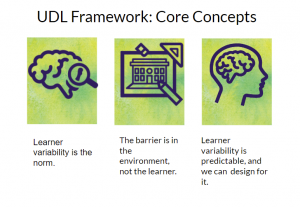
Public-Private Partnerships Breakout: Developing Effective Partnerships with the Private Sector for Work-based Learning
Attendees received rich insights on how local and state systems can work in tandem to empower employers and educators to develop effective work-based learning partnerships with a focus on rural communities. Advance CTE-ECMCF Postsecondary CTE Fellow Rich Crosby focused on utilizing existing collaborative spaces and partnerships as well as creating regional consortiums to connect employers and better understand learner needs, particularly in rural areas where employers are less concentrated.
Montana State CTE Director Jacque Treaster shared a variety of delivery models for work-based learning that strive to expand access to these experiences, particularly for rural learners, including a hub-and-spoke model and distance learning for concurrent and dual enrollment programs.
The session included a rich attendee discussion on models in other states, including Hawaii’s hub and spoke model and Nevada embedding work-based learning into Career Technical Student Organizations (CTSOs) award programs.
Quality Breakout: Promising Tools, Strategies and Research Findings to Improve the Quality of CTE Programs
MDRC Senior Associate Dr. Rachel Rosen shared insights on the models and research structures that allow for ethical and impactful CTE research. She noted that significant strides have been made to improve research quality, and that recent studies show significant value of CTE for male learners and learners with disabilities. ExcelInEd’s Adriana Harrington walked attendees through their Pathways Matter website that consolidates state case studies, best policy practices, and sample learner stories of pathway navigation to enhance quality and alignment of career pathways.
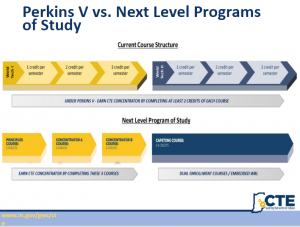 Indiana State CTE Director Anthony Harl shared his state’s dedicated program quality initiative, Next Level Program of Study that allows high school students to earn up to 30-hours of college credit (a technical certificate) while in high school in 65 programs of study. Course design in this initiative focuses on more intentional sequencing of skillbuilding and a longer runway for early postsecondary opportunities paired with work-based learning.
Indiana State CTE Director Anthony Harl shared his state’s dedicated program quality initiative, Next Level Program of Study that allows high school students to earn up to 30-hours of college credit (a technical certificate) while in high school in 65 programs of study. Course design in this initiative focuses on more intentional sequencing of skillbuilding and a longer runway for early postsecondary opportunities paired with work-based learning.
Systems Alignment Breakout: Linking Workforce to Education through Strategic Goal Alignment
“Our role is to connect the fire hose to the garden hose.” – Joy Hermsen
Washington State’s State CTE Director Eleni Papadakis, whose Perkins designated agency is the Washington State Workforce Training and Education Coordinating Board, provided details on how the state’s workforce agency leveraged a strategic plan and data to improve learner outcomes, including energized local youth council and work-based learning that is more responsive to local needs due to partnerships led primarily by employers rather than led by government.
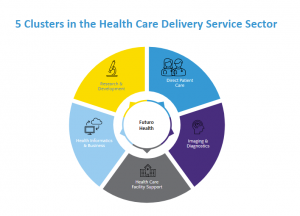 Futuro Health DIrector of Innovative Partnerships Joy Hermsen provided a national perspective on efforts to connect health employers to talent pipelines. She shared how the organization is bridging the gap between education leader and employers through resources that map responsive career lattices and ladders and customized data reports to help learners successfully connect to health careers.
Futuro Health DIrector of Innovative Partnerships Joy Hermsen provided a national perspective on efforts to connect health employers to talent pipelines. She shared how the organization is bridging the gap between education leader and employers through resources that map responsive career lattices and ladders and customized data reports to help learners successfully connect to health careers.
What’s Ahead
The final event of the June Meeting Series is scheduled for June 22 from 2 to 5 p.m. ET, respectively. This session will center around the theme ELEVATE: Building Awareness of and Support for High-Quality and Equitable CTE. Visit the June Meeting Series event webpage to view the event agenda and to register.
Stacy Whitehouse, Senior Associate Communications and State Engagement
